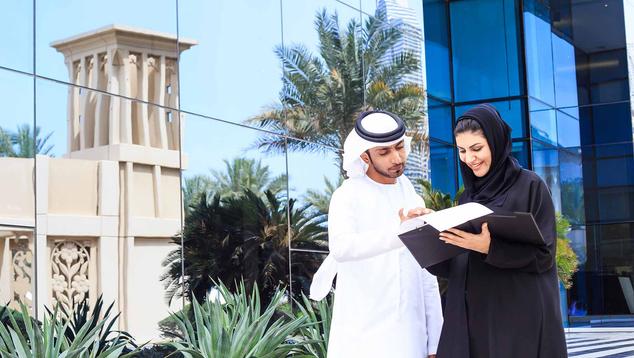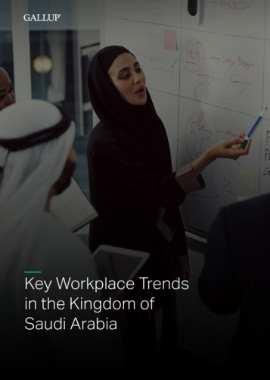Story Highlights
- 76% of employees feel enthusiastic about Saudi Arabia's Vision 2030
- More Saudi employees are actively looking for a new job than before
- Government entities show trust in leadership while the private sector lags
Saudi Arabia's Vision 2030 was first introduced in 2016 as a road map to achieving the Kingdom's economic aspirations and transforming the lives of its citizens. Gallup polls from that year reflected a growing optimism and more positive life evaluation, especially among Saudi nationals.
Six years later, the Kingdom's Vision 2030 is central to the Saudi experience today: A significant majority of three in four employees (76%) strongly agree that they feel enthusiastic about Vision 2030, according to a 2022 Gallup survey.
But although Saudi workers support the program generally, they are less confident about the role of their own organization within that broader vision. Significantly fewer employees (60%) strongly agree that their company is well-positioned to contribute to the vision.
Although Saudi workers support the program generally, they are less confident about the role of their own organization within that broader vision.
The three main pillars of Vision 2030 describe the program's aspirations: a vibrant society, a thriving economy and an ambitious nation. How are Saudi workplaces contributing to these pillars? Where are they succeeding, and where can they grow from here?
A Vibrant Society
The first of the three pillars of the Vision 2030 is "a vibrant society," which includes promoting a healthy lifestyle. And indeed, the physical health of Saudi employees seems to be exceptional, based on self-reports: Three in five employees (63%) strongly agree that their physical health is near-perfect.
So, employees in Saudi Arabia seem to be well-positioned in terms of wellness, but how do they score in wellbeing? As Gallup research shows, wellbeing is more than just physical health.
Here the picture isn't so rosy: Over half of employees in Saudi Arabia report that they have felt burned out in the last month due to work-related stress. And, what's worse, burnout is increasing -- from 55% in 2019 to 57% in 2022. Burnout directly affects performance and productivity, creating headwinds for economic prosperity.
High levels of burnout have costs outside of work as well. One element of this pillar focuses on strengthening the family and encouraging parents to participate more in their children's education. However, fewer than two in five employees (38%) strongly agree that their job allows them to spend enough quality time with their family and friends. And perhaps more significantly, 36% say that, in the past month, there were three or more days where work-related stress caused them to behave poorly with their family and friends.
What can employers do to reduce burnout and improve the wellbeing of employees and their families?
To reduce burnout, leaders need to train managers to identify and address the most common causes of burnout. Managers can help employees by clarifying expectations, assisting prioritization and managing workloads.
To improve wellbeing, managers need to have trusting relationships so they can talk about wellbeing with their team members.
A Thriving Economy
The Saudi economy is growing at a rapid pace, projected to be among the fastest growing economies in 2022. To progress economically in a sustainable way, the second pillar "a thriving economy", makes it a major goal to retain Saudi employees and attract talent from beyond the national borders to the Kingdom. This means companies need to work even harder to create attractive workplaces that retain valuable talent.
However, Saudi Arabia has seen a significant increase in employees who are currently actively looking for a new job (from 11% in 2019 to 24% today). When including employees who are not actively looking for a job but are still open to new job opportunities, there's an even more significant increase, from 30% in 2019 to almost half (48%) in 2022.
But what is making Saudi employees more likely to move on to another company? One possible explanation could be related to a decrease in employees who strongly agree they are paid appropriately (43% in 2019 vs. 38% in 2022) and decreasing satisfaction with growth opportunities at work (from 52% in 2019 to 44% in 2022).
Another element to consider is employee engagement: Engaged employees are highly involved in and enthusiastic about their work. They drive performance and move the organization forward. Employees who are not engaged are psychologically unattached to their work. They put in the time, but not the energy or passion. Lastly, actively disengaged workers are unhappy at work and potentially undermine what their engaged coworkers accomplish every day.
Gallup data shows that employee engagement plays a significant role in retention. While nearly half (47%) of actively disengaged workers and 22% of not engaged workers are currently actively looking for a new job, this number shrinks to 19% for engaged workers. And only a quarter of employees (24%) in the Kingdom are currently engaged -- meaning there is huge potential for leaders to enhance the employee experience to improve retention.
Employers must prioritize employee engagement in the workplace if they want to attract and retain the region's top talent, an essential ingredient in organizational and national prosperity.
An Ambitious Nation
The third pillar of the Kingdom's Vision 2030, "an ambitious nation," revolves around accountability, transparency, and effectiveness in its governing strategy. A key enabler for individuals and teams to thrive and achieve accelerated performance is trust in leadership. The good news is more employees (54%) strongly agree that they trust the leadership of their organization, than in 2019 (48%). And more importantly, there has been an increase in employees who strongly agree that the leadership of their company makes them more enthusiastic about the future (47%).
However, government entities are outpacing the private sector when it comes to trust in leadership (70% government vs. 51% private), creating enthusiasm for the future (60% government vs. 44% private), and engagement (30% government vs 23% private). Companies in Saudi Arabia need to step up to meet their government's leadership. The potential is there, now it's time for leaders to take advantage of the spirit of transformation and the enthusiasm for the future of the Kingdom.
With the aim of increasing the productivity of its employees to the highest levels possible, the government's role in engaging the Kingdom's civil service workforce is even more critical. If leaders in Saudi Arabia focus on moving employees from the not engaged group to the engaged category in the coming years, they are positioned favorably to deliver on the ambitious goals of Vision 2030.
Build a workplace where employees succeed:
- Learn more about key workplace trends in Saudi Arabia.
- Discover the causes and cures of employee burnout.




